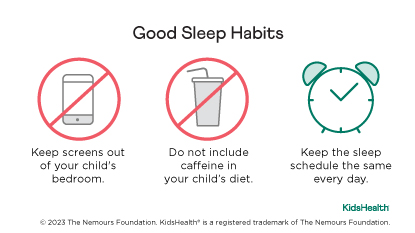Insomnia: How to Care for Your Child
Insomnia is when someone can't fall asleep or stay asleep. Not getting enough sleep can cause tiredness during the day, problems concentrating, difficulty in school, and irritability. Help your child sleep better by encouraging good sleep routines and healthy habits.


Sleep Routines
-
Have your child keep regular bedtimes and wake-up times:
-
Bedtime should be close to the time that your child tends to be naturally sleepy.
-
On weekends, try to stick to the sleep schedule as much as possible. Aim for sleep or wake-up times no more than an hour later than on weekdays.
-
Your child should have a relaxing bedtime routine. It should take about 30 minutes and can include going to the bathroom, brushing teeth, and quiet activities like reading.
-
Keep the bedroom quiet and restful. Do not keep a TV or video game system there. Turn off computers, tablets, cellphones, and video games at least an hour before bedtime. Keep cellphones out of the bedroom.
-
Keep the bedroom dark. A nightlight is OK if your child wants one.
-
Try a white noise machine, electric fan, or soft music if noise from outside the room keeps your child awake or wakes them during the night.
-
If your child wakes at night:
-
They can try counting back from 50 or thinking of a calm, soothing scene.
-
If your child can't fall back to sleep within 30 minutes, they should get out of bed and do a quiet activity such as reading for about 20 minutes, then return to bed. They should not do any screentime in the middle of the night.
Healthy Routines
-
Make sure your child gets plenty of physical activity (outdoors, if possible) every day.
-
Help your child find ways to relax. For example, they can put aside time every day to do something they enjoy, such as drawing or listening to music. Or they can try yoga or meditation.
-
Ask your child about stress, anxiety, and sadness in their life. Ask if it would help for them to talk to a counselor or therapist.
-
It's best for your child to avoid caffeine (found in sodas, tea, coffee, chocolate, and energy drinks) completely. If they do have caffeine, make sure it's before 2 p.m.
-
Talk to your health care provider about any medicines or supplements your child takes.
-
Do not give your child sleeping pills or over-the-counter sleep aids (the kinds you can buy without a prescription) unless your health care provider tells you to.

Your child:
-
still has trouble sleeping after following your health care provider's instructions
-
is cranky or seems sad more than occasionally
-
snores loudly or seems to have gaps in their breathing during sleep
-
moves around in their sleep a lot

How much sleep does my child need? Sleep needs can vary, but in general:
-
3- to 5-year-olds need about 10–13 hours (including naps) a day
-
6- to 12-year-olds need about 9–12 hours a day
-
13- to 18-year-olds need about 8–10 hours a day
How do we keep a sleep diary? If your health care provider asks you and your child to keep a sleep diary, include this information every day:
-
when your child goes to sleep and wakes up (including any naps)
-
whether your child has trouble falling asleep, staying asleep, or both
-
what helps your child fall back to sleep
-
whether your child snores or moves around a lot during the night
-
whether your child is tired during the day
-
any mood problems (such as sadness or irritability) or behavioral issues (such as hyperactivity) your child has during the day